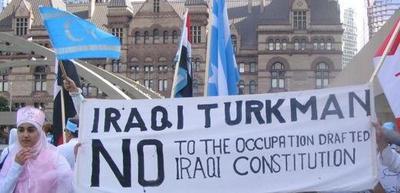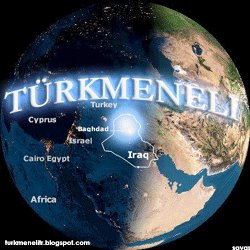Source: ReutersBy Aref Mohamed
 Turkmens of Iraq protestors from all over the world says NO to the dratf
Turkmens of Iraq protestors from all over the world says NO to the dratfKIRKUK, Iraq, Oct 13 (Reuters) - Iraq's government and its U.S. backers hope Saturday's referendum on a new constitution will help unite the country, but nowhere is the challenge of healing ethnic and sectarian tensions more palpable than Kirkuk.
The city, perched over one of the world's great lakes of oil, is claimed by three competing ethnic groups -- Kurds, Turkish-speaking Turkmen and Arabs.
With two days to go before the referendum, many voters in Kirkuk say they will cast their ballots purely along ethnic and communal lines as a way to safeguard their groups' interests.
Such an outcome does not bode well for the future of Kirkuk, where debate on its final status has been set aside until after a constitution is ratified and where observers say ethnic rivalries make it a potential flashpoint of a civil war.
"All Kurds will vote in favour of this constitution, including me, because it is the result of our struggle," said Zaman Khorshid, a Kurdish teacher.
"It will guarantee the rights of Kurds and it is the best accomplishment for the Kurdish movement, which gave hundreds of thousands of martyrs in order to reach to this day."
The Kurds, who accuse Saddam Hussein of 'Arabising' Kirkuk with Arab migrants from the south, want the city to be part of their autonomous region of Kurdistan, which begins just 20 km (12 miles) to the north and west of the city.
Arabs in turn accuse Kurds of packing the city with their ethnic kin to skew a forthcoming census, and of forcing out non-Kurds. They firmly reject claims that Kirkuk is part of Kurdistan.
Echoing fears shared by many Sunni Arabs across the country that the charter will split up Iraq, Mohammed Khalil said he will vote against the constitution, which is backed by most Shi'ites and Kurds.
"We will definitely take part in the referendum and we have called on the people to participate. But we will reject the constitution because it stands for sectarianism and it will divide Iraq," said Khalil, who is a member of the local council.
Tariq al-Sairfachi, a Turkmen engineer, also said he will vote 'No'. The Turkmen also lay claim to historical primacy in the city of one million.
"I'll participate and say a thousand times 'No' simply because (the constitution) did not meet the ambitions of Iraq's third largest group, the Turkmen," Sairfachi said.
"Turkmen will reject this constitution."
While most people in Kirkuk plan to vote, some say they will boycott the ballot completely. Bahman Abdul Qadir, a Sunni Arab religious school student, said there was no point in voting because of foreign interference in Iraq.
"I won't take part in this mockery as long as I live. The occupier writes for us and invites us to vote for it," he said. "They (occupiers) will pass what they want whether we will vote 'Yes' or 'No'."
